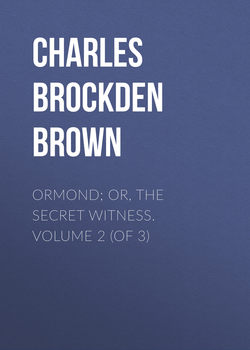Ormond; Or, The Secret Witness. Volume 2 (of 3)

Реклама. ООО «ЛитРес», ИНН: 7719571260.
Оглавление
Charles Brockden Brown. Ormond; Or, The Secret Witness. Volume 2 (of 3)
CHAPTER I
CHAPTER II
CHAPTER III
CHAPTER IV
CHAPTER V
CHAPTER VI
CHAPTER VII
CHAPTER VIII
CHAPTER IX
Отрывок из книги
I know no task more arduous than a just delineation of the character of Ormond. To scrutinize and ascertain our own principles is abundantly difficult. To exhibit these principles to the world with absolute sincerity can hardly be expected. We are prompted to conceal and to feign by a thousand motives; but truly to portray the motives, and relate the actions of another, appears utterly impossible. The attempt, however, if made with fidelity and diligence, is not without its use.
To comprehend the whole truth with regard to the character and conduct of another, may be denied to any human being, but different observers will have, in their pictures, a greater or less portion of this truth. No representation will be wholly false, and some, though not perfectly, may yet be considerably exempt from error.
.....
That in which he chiefly placed his boast, was his sincerity. To this he refused no sacrifice. In consequence of this, his deportment was disgusting to weak minds, by a certain air of ferocity and haughty negligence. He was without the attractions of candour, because he regarded not the happiness of others, but in subservience to his sincerity. Hence it was natural to suppose that the character of this man was easily understood. He affected to conceal nothing. No one appeared more exempt from the instigations of vanity. He set light by the good opinions of others, had no compassion for their prejudices and hazarded assertions in their presence which he knew would be, in the highest degree, shocking to their previous notions. They might take it, he would say, as they list. Such were his conceptions, and the last thing he would give up was the use of his tongue. It was his way to give utterance to the suggestions of his understanding. If they were disadvantageous to him, the opinions of others, it was well. He did not want to be regarded in any light but the true one. He was contented to be rated by the world at his just value. If they esteemed him for qualities which he did not possess, was he wrong in rectifying their mistake: but in reality, if they valued him for that to which he had no claim, and which he himself considered as contemptible, he must naturally desire to show them their error, and forfeit that praise which, in his own opinion, was a badge of infamy.
In listening to his discourse, no one's claim to sincerity appeared less questionable. A somewhat different conclusion would be suggested by a survey of his actions. In early youth he discovered in himself a remarkable facility in imitating the voice and gestures of others. His memory was eloquently retentive, and these qualities would have rendered his career, in the theatrical profession, illustrious, had not his condition raised him above it. His talents were occasionally exerted for the entertainment of convivial parties and private circles, but he gradually withdrew from such scenes as he advanced in age, and devoted his abilities to higher purposes.
.....